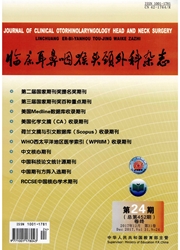

 中文摘要:
中文摘要:
耳鸣在临床工作中十分常见,是在没有外界声源的情况下却有声音感知,这种声音感知可以是主观性的也可以是客观性的,通常以主观性耳鸣为多见。据报道,美国成年人群中耳鸣发病率为10%-15%〔1〕,约有超过5千万的耳鸣人群,但因耳鸣而就诊的患者并不如此之高。可以说,影响耳鸣的因素很多,包括疾病如梅尼埃病、突发性聋以及噪声、心理因素等,其中心理因素在耳鸣的发生和发展中的作用越来越受到关注。
 英文摘要:
英文摘要:
Tinnitus is a common clinical disorder,which may generate from a lot of causes,including otological disease and other systemic diseases associated with tinnitus or some factors such as insomnia and emotional cognition.Some studies have found that mood is associated with the occurrence and development of tinnitus and that psychological factors play a role in the occurrence and development of tinnitus in the tinnitus patients with mood disorders.At the same time,the psychological distress and emotional problems caused by tinnitus have drawn more and more attention of clinicians.Based on this,the cognitive theory of emotion can be helpful for evaluating tinnitus,and patients with severe tinnitus can be relieved by biofeedback information in tinnitus management.This article will analyze literature in these disciplines.
 同期刊论文项目
同期刊论文项目
 同项目期刊论文
同项目期刊论文
 期刊信息
期刊信息
